Ugandan Anatoli Kirigwajjo’s YUNGA App in race for 2023 Africa Prize for Engineering and Innovation
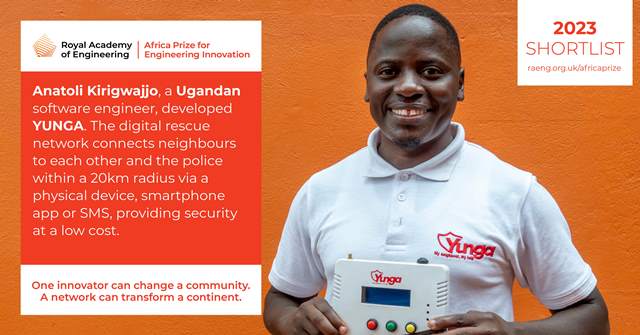
Ugandan Anatoli Kirigwajjo has made it to the shortlist of the Royal Engineering Academy’s 2023 Africa Prize for Engineering and Innovation. With his YUNGA App, a local digital network connected through a physical device utilising the Internet of Things to provide security at a low cost in under-resourced areas, Kirigwajjo joins 14 other innovators from Angola, Cameroon, Ethiopia, Ghana, Nigeria, Sierra Leone, South Africa, Tanzania and Zimbabwe, to compete for the £25,000 Africa Prize for Engineering Innovation.
He is up against stiff competition from innovative technologies that address environmental rehabilitation, education, and human health. The 2023 shortlist represents ten African countries, including for the first time Angola and Sierra Leone, and demonstrates the importance of engineering as an enabler of improved quality of life and sustained economic development.
The innovations shortlisted in 2023 tackle challenges central to the UN’s Sustainable Development Goals, including clean water and sanitation, sustainable cities and communities, good health and wellbeing, and clean energy, good health and wellbeing, and quality education.
Several water innovations are featured in the 2023 shortlist, including a real-time water quality monitoring and control system, an acid mine drainage solution to recycle contaminated water for human consumption, a portable unit that uses fish waste to boost production of vegetables, and a water management system to prevent excess borehole pumping and drying out of aquifers.
Energy and environmental solutions also feature heavily, with a power pack with recycled laptop batteries to address unreliable power supply, converted motorbikes that run on batteries, an electric cargo bike with a battery-powered fridge to reduce post-harvest loss, a system to help prepare waste for recycling, a mobile machine to create interlocking compressed earth bricks, and an ecofriendly cooking stove that absorbs black carbon.
Additionally, several entrepreneurs shortlisted have pioneered solutions in health, safety and education, with a portable hysteroscopy device for simple examination of the uterus, a remote healthcare monitoring system that records and transmits patient data, a multi-strain probiotic to improve the gut health of chickens, a local rescue network connecting neighbours with the police, and a robotics learning tool for children.
Launched in 2014, the Africa Prize for Engineering Innovation is awarded annually by the Royal Academy of Engineering to ambitious African innovators creating local and scalable solutions to pan-African and international challenges. Innovators shortlisted for the Africa Prize will benefit from a unique package of support including business incubation, mentoring, fundraising and communications. The package also includes access to the Academy’s global network of high-profile and highly experienced engineers and business experts in the UK and Africa.
Four finalists will be chosen to pitch their innovations and business plans to Africa Prize judges at an event in Accra, Ghana on 6 July 2023. The winner will receive £25,000, and three runners up will win £10,000 each. An additional One-to-Watch award of £5,000 will be given to the most promising entrepreneur from the remaining shortlist.
This year’s shortlisted entrepreneurs join the Academy’s 134-strong Africa Prize alumni network, which includes innovators who have achieved significant commercial success and social impact across the continent following their participation in the Prize, such as 2022 winner Kenyan Norah Magero, and her portable solar-powered fridge solution for transporting medicines.
Africa Prize alumni are projected to have an impact on more than three million people in the next five years, and have already created 3,585 jobs – including 1,766 for women and 211 for persons with disabilities – and raised more the USD 14 million in grants and equity funding, directly contributing to 12 of the UN Sustainable Development Goals. The programme is currently seeking additional partners and funders to help to positively impact millions more.
Rebecca Enonchong FREng, founder and CEO of AppsTech and Africa Prize judge, said,
“Climate change is impacting Africa more severely than other continents, with agricultural production, food security and water resources being compromised, compounded by a weak adaptive capacity. This year, 11 of our innovations are contributing directly to environmental sustainability.”

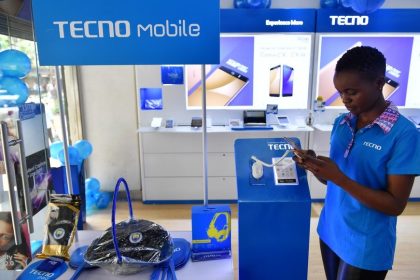 Chinese brands strengthen hold on African smart phone market in 2023
Chinese brands strengthen hold on African smart phone market in 2023
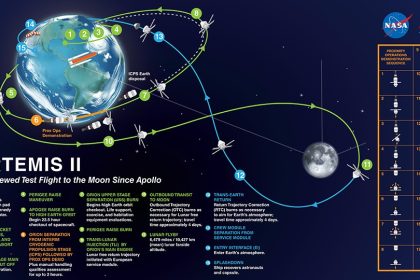 Boeing opens African pathways to space
Boeing opens African pathways to space
 Rolls-Royce basks in expanding African footprint
Rolls-Royce basks in expanding African footprint
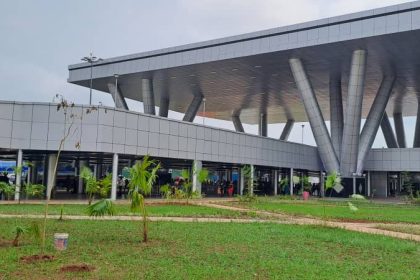 Airlines and airports spent a record USD 45 billion on IT in 2023
Airlines and airports spent a record USD 45 billion on IT in 2023
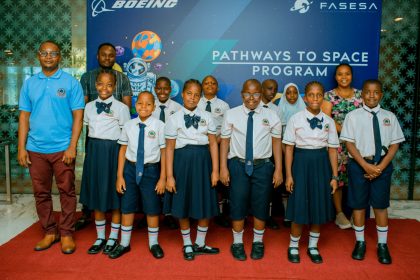 Tanzania, Ethiopia join Boeing supported space education initiative
Tanzania, Ethiopia join Boeing supported space education initiative
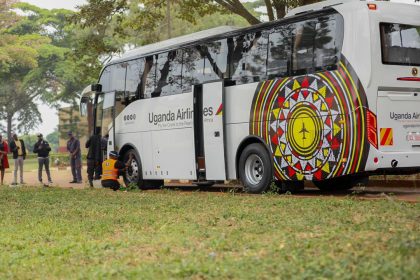 KMC projects need for 6000 electric bus drivers in Uganda by 2028
KMC projects need for 6000 electric bus drivers in Uganda by 2028
